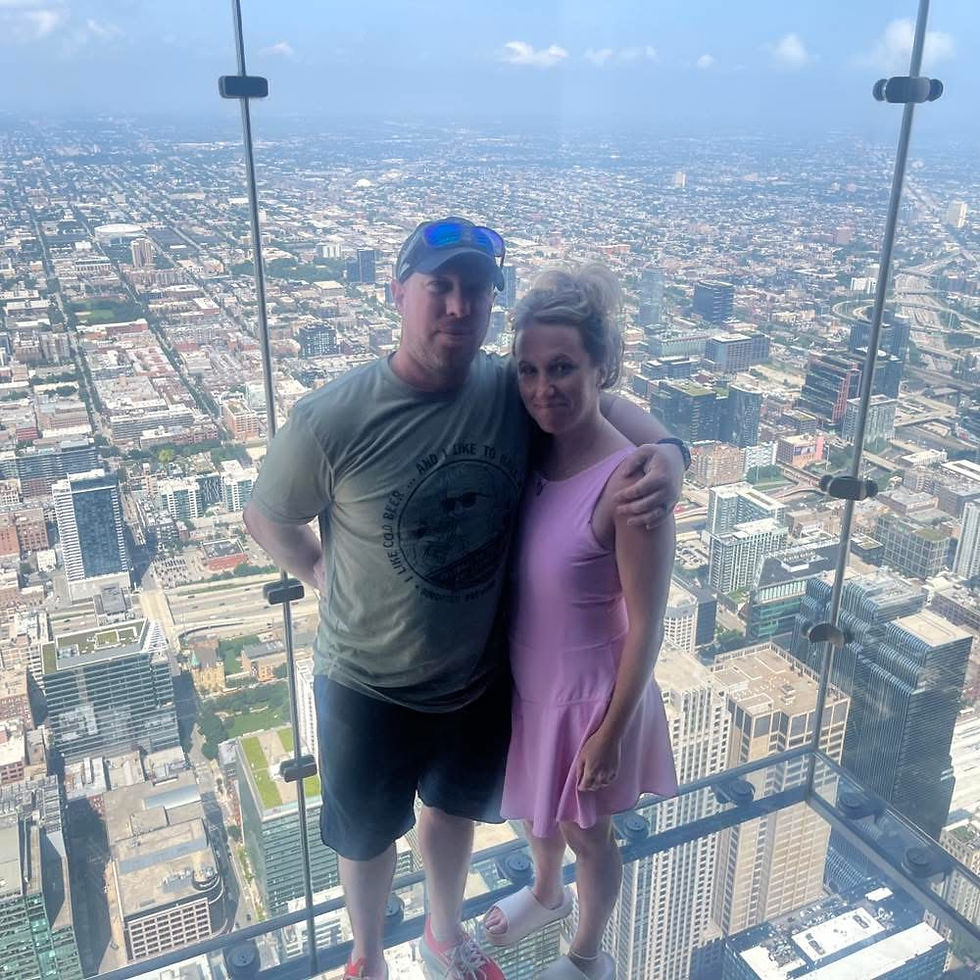Standing by Their Side: A Practical Way to Help Someone with PTSD
- Caitlin Lagnese

- Oct 22, 2025
- 3 min read
Updated: Oct 29, 2025

I find immense joy in the cathartic writing process, and I cherish revisiting pieces that resonate deeply. My blog celebrates the stories we share, retell, and the little lessons we learn along the way. As I mentioned a few months ago, while driving to Chicago with my husband for our 12 year wedding anniversary trip, I experienced a moment that brought my PTSD to the forefront. It struck me then that while PTSD can eventually fade into the background, the impact of trauma still remains within us. It made me reflect on a small piece I wrote a while ago on PTSD advocacy:
Navigating the challenges of PTSD is a complex journey, but having a strong support system can significantly impact your healing process—potentially even saving your life. After experiencing a traumatic sexual assault in college, I struggled in silence for years before seeking help.
I was engulfed by a profound sense of overwhelm and shame at the idea of sharing and reliving the actual rape as well as the ongoing battle with my mental health. I believed these burdens were too heavy and ugly for others to carry. I also felt extremely embarrassed by my poor choices and coping mechanisms. Despite my attempts to conceal these demons, they were glaringly obvious. I had to learn the hard way that by trying to outrun the pain, I was not only harming myself but also my family and friends—the very people I wanted to protect.
When I finally stepped out of the shadows of shame and began my healing journey, my husband stood by my side as my greatest supporter, next to God of course. With his hand in mine, he offered the comfort and reassurance I so desperately needed. Instead of responding with judgment or frustration, he approached me with hope and love. He frequently expressed how proud he was of me as I navigated EMDR therapy, and he would check in after my psychiatrist appointments, always ready to listen if I wanted to share. He never made me feel irrational, inadequate, or crazy. Simply put, my husband and kids truly saved my life. I will always be grateful for their unwavering support, and I’m committed to giving them the best version of me. I also want to note the love and support from my other family members and close friends. I can’t even begin to count the hours I spent on the phone with my mom or the times a friend reached out simply to express their pride in me. Remembering how my tribe came together for me still brings tears to my eyes.
For those supporting a loved one through the challenging journey of PTSD, my most important piece of advice is to walk alongside them with kindness, empathy, and grace. This approach made a tremendous difference in my life. While I will always carry PTSD with me, it has become much more manageable, and I have discovered a sense of peace and forgiveness regarding my experiences

What a meaningful moment to reflect on! Talk about a full-circle moment. I know I talk a lot about my husband but it’s because he plays such a crucial role in my life. He’s my life partner, my best friend, my lover, and my soul mate. When we said our vows, we became a true team, intertwining our lives and hearts into one shared love.

My challenges became his and his became mine. I used to feel guilty about that. Loving someone with a mental illness can be tough, yet my husband would say it also reveals moments of extraordinary beauty. Now nearly 14 years later, I’ve discovered a sense of stability. I’ve become attuned to the signs of an approaching PTSD flare-up or manic episode and I’ve learned how to seek the support I need. However, this journey hasn’t been easy. In my darkest times, when I felt as if I were sinking in quicksand, my husband was always there, extending his hand to help lift me out. I remember suggesting, early in our marriage, that he should leave me, convinced he and our children deserved better. Yet for him, that was never an option. He frequently reminds me that he recognized my true self long before I did. Since 2007, we’ve nurtured a beautiful love that I wouldn’t exchange for anything. It’s truly remarkable to have built a genuine partnership where we can now both share our hearts openly. I would travel to the ends of the earth for that man, just as he would for me.

Whatever trauma you may be facing friends, I'm rooting for you. Don’t hesitate like I did—reach out to a family member or friend, join a support group, or give counseling a try. Take it from me, seeking help isn’t weak, it’s actually the strongest thing you can do. And hey, you just never know who you may be helping and inspiring along the way!
Love,
Caitlin


Comments